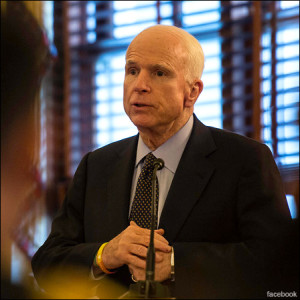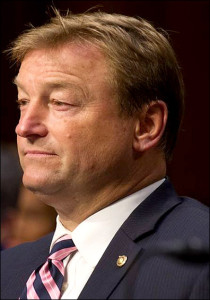By Jim Ellis
 May 21, 2018 — Gravis Marketing went into the field two days after the Indiana primary ended to test the new general election pairing between Sen. Joe Donnelly (D) and former state representative and businessman Mike Braun (R). According to the poll (May 10-15; 400 likely Indiana voters), the race has already lapsed into a dead heat.
May 21, 2018 — Gravis Marketing went into the field two days after the Indiana primary ended to test the new general election pairing between Sen. Joe Donnelly (D) and former state representative and businessman Mike Braun (R). According to the poll (May 10-15; 400 likely Indiana voters), the race has already lapsed into a dead heat.
Forecast as a toss-up all the way to November, Gravis finds Braun, who scored a 41-30-29 percent Republican primary plurality victory over Reps. Todd Rokita (R-Brownsburg/ Lafayette) and Luke Messer (R-Greensburg/Muncie), respectively, edging Sen. Donnelly by a single point on the first ballot test, 45-44 percent.
When respondents leaning to both candidates are added, Gravis reports that Braun is up 47-46 percent. The pollsters pushed the undecideds to make a choice, but the secondary responses reportedly break 19-13 percent for Sen. Donnelly, while the remaining 69 percent maintain they are still undecided. Adding these totals into the decided ballot test appear to produce a 46-46 percent split, but the Gravis analysis gives Braun the one-point lead. Regardless of the mathematical fine-tuning, these results conclude that the Indiana Senate race is already in pure toss-up mode.
Sen. Donnelly posts a 41:40 percent favorable to unfavorable job approval score. This includes 11 percent who say they strongly approve and 18 percent who strongly disapprove. In comparison, President Trump posts a 47:47 percent score, with 24 percent strongly approving and 35 percent strongly disapproving. Indiana’s junior senator, Todd Young (R-IN), was also comparatively tested and recorded a 36:34 percent favorability index (ine percent strongly favorable; 15 percent strongly unfavorable). Hoosier State Gov. Eric Holcomb (R) fared best in the Gravis poll, however. His job approval index is 54:30 percent, with 16 percent and seven percent strongly approving and disapproving, respectively.





